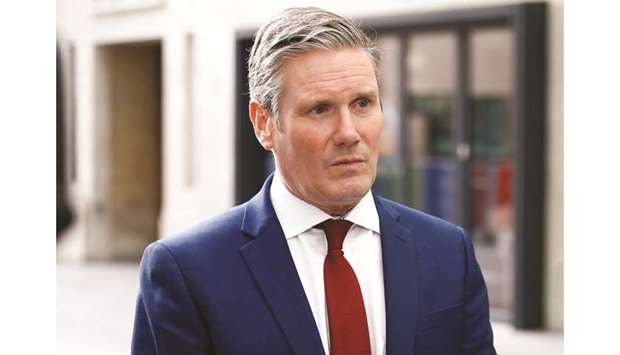A defiant government doubled down yesterday, insisting it would leave the European Union in 11 days’ time despite parliament forcing a reluctant prime minister to request another delay.
In a day of high drama on Saturday, MPs in the House of Commons passed up the chance to decide on the revised withdrawal agreement that Prime Minister Boris Johnson had negotiated with the European Union.
That defeat leaves Johnson under mounting pressure to find a way out of paralysing impasse on when and how Britain would leave the EU bloc after Britons narrowly voted to exit in a 2016 referendum.
Late Saturday, Johnson reluctantly sent European Council president Donald Tusk a letter legally imposed on him by parliament requesting an extension — but refused to sign it.
The Conservative leader later sent a second, signed letter insisting he was not seeking an extension to the Brexit deadline, which has already been postponed twice, warning that “a further extension would damage the interests of the UK and our EU partners”. Having failed to back a divorce deal, which Johnson had secured on Thursday, MPs triggered a law requiring him to write to EU leaders asking to delay Brexit, to avoid the risk that Britain crashes out in less than a fortnight’s time.
Senior Cabinet minister Michael Gove, the government’s Brexit planning chief, was nonetheless adamant that Britain would leave the EU on schedule.
“Yes. We are going to leave on October 31. We have the means and the ability to do so,” he told Sky News television.
The government will bring forward this week the domestic legislation needed to implement the divorce deal, with a first vote as soon as tomorrow.
Separately, it is seeking a new yes-or-no vote on approving the deal today, although this may fall foul of parliamentary procedure.
Commons Speaker John Bercow will rule on whether Johnson can hold a “meaningful vote” on the deal. “If we get the legislation through then there is no extension. October 31 is within sight,” said Gove.
He said it was dangerous to assume that the 27 other EU leaders would grant an extension.
More than three years on from the June 2016 vote to leave the EU, Foreign Secretary Dominic Raab told BBC television that from his conversations with other EU capitals, “they are fed up with this now — and we are fed up with it”. Johnson’s number two added that he was “confident” of leaving on October 31. Earlier Labour finance spokesman John McDonnell said the party will try to amend legislation to ratify Prime Minister Boris Johnson’s Brexit deal.
“We’ll be moving amendments and see whether or not we can get some form of agreement through the House of Commons that’s then acceptable,” McDonnell told Sky News, citing issues Labour wants to see included such as protection of workers’ rights.
He also said the issue of a second Brexit referendum would “almost inevitably come up”, but that any amendment proposing one would be more widely accepted by lawmakers from other parties if it did not come from Labour’s leadership team.
“We’ve always said actually let the people decide,” he said.
McDonnell said Johnson’s decision to send an unsigned letter to the EU requesting a delay to Brexit as well as another note in which he explained that he did not want a “deeply corrosive” extension could put him in contempt of court.
“He may well be in contempt of parliament or the courts themselves because he’s clearly trying to undermine the first letter,” McDonnell said.
“And by not signing the letter he’s behaving a bit like a spoiled brat, parliament made a decision, he should abide by it.”
Meanwhile Brexit Party leader Nigel Farage yesterday said a short delay to Brexit in order to hold a national election would be better than accepting Prime Minister Boris Johnson’s deal.
“I want to leave on the October 31, but I’ll warn everybody that if this treaty goes through nothing will have changed at all, and I think far better to have a short delay and a general election where we might solve this,” Farage told Sky News, adding that Johnson’s deal was “rotten” and “not Brexit”.

Labour Party’s shadow secretary of State for Brexit Keir Starmer speaks to the media as he leaves the BBC headquarters after appearing on The Andrew Marr Show in London yesterday.
